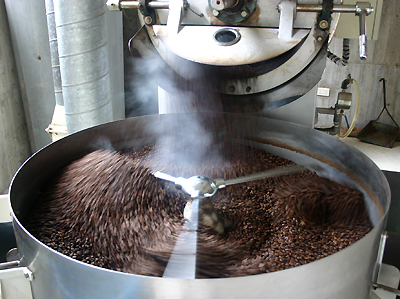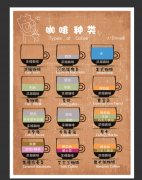A brief introduction to the Origin, Development, History and Culture of El Salvador Pacamara Fine Coffee beans

Salvadoran fine coffee is concentrated in Santa Ana in the west and Charantan Nango volcanic rock producing areas in the northwest. In recent years, almost all of the top ten cup tests come from these two producing areas, with an altitude of about 900-1500 meters. Bourbon is the main one (accounting for 68%), followed by Pacas (accounting for 29%), and mixed Pacamara, Duraai and Kadura only account for 3%.
The coffee harvest lasts from November to March. are hand-picked to harvest fresh coffee.
This variety is characterized by its lively acidity, sometimes biscuit flavor, sometimes fruit flavor, excellent thickness and grease feeling. Best quality from El Salvador and Guatemala
Finca Ataisi Manor is located in the volcanic producing area of Izalco (Izaco) region in Sonsonate Province of El Salvador. Due to the volcano, the soil of the manor contains very rich organic matter. The average altitude of the manor is about 1,800 meters and the terrain is steep. It is one of the highest manors in the local area. At present, the manor is mainly managed by Mr. Rene Martin, the owner of the manor. Mr. Rene Martin's idea is to maintain the original traditional planting method of El Salvador as much as possible. In addition to the necessary pruning and irrigation, the garden maintains a wide range of natural agroforestry ecology, and more than 90% of the estate is planted with Pacamara varieties first developed by Salvadoran researchers in 1958. Pacamara is a rare excellent variety under artificial breeding. Green is better than blue. It perfectly inherits the advantages of the mother plant. It has the excellent taste of Pacas. The raw bean particles inherit the big size of Maragogipe. The bean body is at least 70%-80% of the elephant bean, 100% of the 17 mesh and 90% of the 18 mesh. The average length of beans is 1.03 cm (generally about 0.8-0.85 cm). The average width of beans is 0.71 cm (generally about 0.6-0.65 cm). The thickness is 0.37 cm. The beans are full and round.
Pacamara: A very complex pedigree, it is a hybrid of the Tibica variety Elephantbean and the Bourbon variety Pacas. Bean is second only to elephant bean, is El Salvador's rising star, but also in the past two years through the global fine coffee hybrid varieties.
He won the 2007 Guatemala and Honduras [COE] double championships, and even won the top three prizes in El Salvador. The name "Pacamara" is well taken, a compound of Pacas and Maragogepe. Pacamara was developed by the Salvadoran Coffee Research Institute in 1957 and 1958. It has only recently become a favorite of fine coffee
Pacamara is another example of a COE event that has made a name for itself. In the 1990s, some farmers in Chalatenango, El Salvador, began planting Pracamara. In 2006, a farm in the region competed as Pacamara and won second place. In 2007, several farms from the same region competed as Pacamara, which won first, third and fourth place. Pacamara is an artificial hybrid of Pacas and Maragogype species, developed by Salvadoran research institutions as early as the 1950s (most refer to 1958). The new variety is considered to be the result of the pursuit of large-grain Arabica species, and well inherits the excellent traits of the parent plant. Pacas is of Bourbon descent, a native Salvadoran variety that inherits the excellent flavor of the ancient Bourbon species and was first discovered in 1949. Maragogype is a variant of Typica that first appeared in Brazil. It is called "elephant bean" because of its large body.
El Salvador's unique superior variety, Pacamara, is a hybrid of Pacas-an abrupt variant of the Bourbon species found in El Salvador, with the giant bean Maragogype-an abrupt variant of the Tibica species found in Brazil.
The interesting thing about Christmas Farm coffee is that it is refined in secret, using mineral rich hot spring water to process green coffee beans. This farm is located in fertile volcanic soil and has abundant natural hot spring water, so all of this natural hot spring water is used when processing raw beans; there are many farms in the world that grow coffee, but this method is still rare.
Additional information about the spa: The water at the source is 85 degrees Celsius. Use 2-inch pipes to channel the water to six different levels of the spa. The temperature at the sixth spa is 32- 34 degrees Celsius. Then use this cooled spa water to process coffee beans. This hot spring water flows continuously all year round. Locals drink this hot spring water. It has a pH of 8.02 and contains ingredients that can sweeten coffee.
Pacamara varieties are artificially bred varieties of Pacas and Maragogipe. It was first developed by Salvadoran researchers in 1958. Pacamara is a rare excellent variety under artificial breeding. Green is better than blue. It perfectly inherits the advantages of the mother plant. It has the excellent taste of Pacas. The raw bean particles inherit the big size of Maragogipe. The bean body is at least 70%-80% of the elephant bean, 100% of the 17 mesh and 90% of the 18 mesh. The average length of beans is 1.03 cm (generally about 0.8-0.85 cm). The average width of beans is 0.71 cm (generally about 0.6-0.65 cm). The thickness is 0.37 cm. The beans are full and round. This variety is characterized by its lively acidity, sometimes biscuit flavor, sometimes fruit flavor, excellent thickness and grease feeling. Best quality coffee from El Salvador and Guatemala. Don't underestimate El Salvador's coffee production. In its heyday, it was the fourth largest coffee producer in the world, but decades of civil war almost brought down the coffee industry. Fortunately, the war stopped in recent years and the coffee industry recovered. The only benefit of the civil war for El Salvador was that farmers left their fields barren and could not catch up with the most popular Catimo train of cultivation in the past two decades, thus preserving the ancient bourbon and tibeka varieties. In other words, El Salvador still cultivated in the most traditional shade method, which had a positive effect on the aroma of coffee. In 2005, the Salvadoran hybrid Pacamara swaggered at the coe, leaving many international cup testers confused and wondering how to grade it. Unexpectedly, this hybrid bean not only broke the boundaries of coffee, but also expanded the visibility of Salvadoran coffee.
Important Notice :
前街咖啡 FrontStreet Coffee has moved to new addredd:
FrontStreet Coffee Address: 315,Donghua East Road,GuangZhou
Tel:020 38364473
- Prev

A brief introduction to the description of the flavor and aroma characteristics of El Salvador Pacamara boutique coffee beans
The biggest feature of this variety is that it is sour, lively and tricky, sometimes biscuit, sometimes fruity, thick and greasy. The best quality Finca Ataisi manor from El Salvador and Guatemala is located in the volcano-producing area of Izalco (Izakou), Sonsonate province, El Salvador. Due to volcanoes, the soil of the manor is very rich in organic matter, and the manor is at an altitude.
- Next

A brief introduction to the market price of El Salvador Pacamara boutique coffee beans with balanced taste
Pacamara is the artificial breeding variety of Pacas and Maragogipe. It was first cultivated by researchers in El Salvador in 1958. Pacamara is an excellent variety under rare artificial breeding, which is better than blue, and perfectly inherits the advantages of the mother plant. It not only has the excellent taste of Pacas, but also inherits the large size of Maragogipe, and the bean body is at least like beans.
Related
- Detailed explanation of Jadeite planting Land in Panamanian Jadeite Manor introduction to the grading system of Jadeite competitive bidding, Red bid, Green bid and Rose Summer
- Story of Coffee planting in Brenka region of Costa Rica Stonehenge Manor anaerobic heavy honey treatment of flavor mouth
- What's on the barrel of Blue Mountain Coffee beans?
- Can American coffee also pull flowers? How to use hot American style to pull out a good-looking pattern?
- Can you make a cold extract with coffee beans? What is the right proportion for cold-extracted coffee formula?
- Indonesian PWN Gold Mandrine Coffee Origin Features Flavor How to Chong? Mandolin coffee is American.
- A brief introduction to the flavor characteristics of Brazilian yellow bourbon coffee beans
- What is the effect of different water quality on the flavor of cold-extracted coffee? What kind of water is best for brewing coffee?
- Why do you think of Rose Summer whenever you mention Panamanian coffee?
- Introduction to the characteristics of authentic blue mountain coffee bean producing areas? What is the CIB Coffee Authority in Jamaica?

